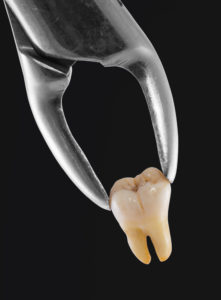
When you visit one of our doctors at Value Smiles, we will examine your mouth and assess your oral health before making recommendations. We will explain your treatment options, and give you the chance to ask questions. Contact us to make an appointment at Value Smiles, and we will help you understand your unique dental situation.
If you need a tooth extracted, Value Smiles is the affordable dentist you’ve been looking for! Our Lithia Springs and Douglasville, GA dental practice provides extractions for uninsured patients at prices as low as $139-199. Ask about our Smile Value Plan to learn more. Call us today at 678-607-9723 to make an appointment.
Why Are Extractions Needed?
Extractions on adults are most frequently recommended when a tooth has been damaged beyond our ability to restore it with a root canal therapy or dental crown. In cases when a tooth is not restorable, an extraction is the often the best way to preserve your oral health. If a decayed or damaged tooth is not removed, it can lead to infection, which can spread to the gum tissue or other parts of the body. Leaving a damaged or decayed tooth in your mouth may eventually result in a painful abscess that causes fever and swelling. In some cases, systemic infections may result from a bad tooth—which can be life-threatening if medical attention is not sought.
Extractions may also be needed to reduce crowding or remove wisdom teeth. Sometimes, a patient who did not have wisdom teeth extracted when they were younger may need to have them extracted later in life, due to decay. (Due to their location, wisdom teeth can be more difficult to clean and floss, which makes them prone to developing cavities.)
Patients with severe gum disease may need to have teeth extracted when the gum tissue has been damaged or destroyed to the point that it cannot support the tooth. In these cases, the extraction is a step that will help you restore the health of your gums and make way for partial or full dentures.
Children may need to have teeth extracted when baby teeth are slow to fall out on their own, or to make room in the mouth so crowded teeth can spread out a bit. Sometimes extractions are recommended before a child can start a course of orthodontic treatments.
Before Your Extraction
If you have been experiencing toothache before the extraction, you can rest assured that the procedure will bring an end to your suffering. If you are not in any pain, take comfort in the fact that the extraction will likely prevent you from experiencing painful toothaches or infections in the future.
Let your dentist know if you are currently taking any medications or have any health conditions that may put you at a higher risk of infection or bleeding.
Medical conditions we should be aware of before any dental procedures include:
- Impaired immune function, or autoimmune disorders
- A history of bacterial endocarditis
- A congenital heart defect
- Liver disease
- Artificial joint replacement
During the Extraction
A simple extraction is usually a fast and easy procedure. After administering an anesthetic to numb all sensation, one of our dentists will gently lift and grasp the tooth with special dental tools. By slowly moving the tooth back and forth, it becomes loose enough to come out easily. This usually only takes a couple of minutes.
More complex extractions may be needed if a tooth has not yet erupted through the gums (as in wisdom tooth extraction), or if the tooth has broken into separate parts. In these cases, oral surgery may be required, as the gum tissue may need to be cut and sutured, in order to get to the tooth.
After Your Extraction
Before you leave, we will give you a gauze pad to bite down on to encourage the blood to clot in the socket. Continue to bite down on gauze pads for up to three hours if you experience continued bleeding. Do not rinse, spit, or suck through a straw for a while, as this can interfere with the healing of the socket.
After your extraction, you should try to rest and take it easy for the rest of the day. Try not to lie flat on your back, but instead keep the head elevated as much as possible. Eat only soft foods, and do not brush or floss at the site of the extraction.
If you experience any pain, apply an ice pack to the cheek at ten-minute intervals and take over-the counter painkillers (such as Advil or Tylenol) as directed on the packaging.
Contact our office if you develop any severe pain, swelling, or bleeding after the first four hours. If you develop a fever, nausea, or chills in the days after an extraction contact us immediately, as you may have developed an infection.
Replacing Your Tooth
If your tooth was extracted due to decay or severe damage, it is always best to have the tooth restored with a dental bridge, partial denture or dental implant. This will prevent changes to the alignment of your teeth and reduce your risk of losing more teeth in the future. Your Value Smiles dentist will schedule an appointment for you to come in and discuss your tooth replacement options once the extraction site has healed.
At Value Smiles, we are proud to be your affordable Lithia Springs and Douglasville GA dentist. Contact us online or call us at 678-737-4245 to find out how we can help you smile again.


